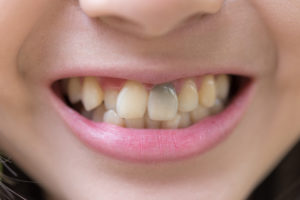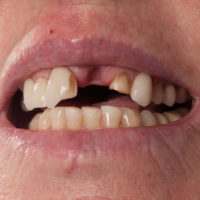What Should I Do if My Tooth Gets Knocked Out?
Thankfully, this is an injury that is relatively rare. Even though it does not happen very often, we are giving you information about how to handle it because when it does happen, knowing what to do can give you a much better outcome.
-
Find the Tooth!
 The first and most important thing you should do is find the tooth. When an injury completely knocks a tooth out of your mouth in one piece, the best-case scenario is reimplantation. Your dentist can put the tooth back into the socket and give you the best chance at keeping the tooth . . . but only if you have the tooth.
The first and most important thing you should do is find the tooth. When an injury completely knocks a tooth out of your mouth in one piece, the best-case scenario is reimplantation. Your dentist can put the tooth back into the socket and give you the best chance at keeping the tooth . . . but only if you have the tooth.
How to Hold the Tooth
When you find the tooth, do not pick it up by the root. If possible, avoid touching the root of the tooth at all.
Do NOT Clean the Tooth.
Do NOT attempt to clean the tooth. There are tiny cells and fibers on the root that will aid the reattachment process. If you try to scrub away dirt, you are likely also scrubbing away those valuable cells and fibers.
Keep the Tooth from Drying Out.
It is important that you keep the tooth from drying out. We know it sounds gross, but the very best thing you can do is hold it inside your mouth. Obviously, only attempt this if you know that you will not swallow it. Even grosser, but still effective, is that you can have someone else hold it in his or her mouth for you. We often advise parents to do this for children who have teeth knocked out.
An alternative to this is filling a small cup or baggie with saliva and placing the tooth within. Just make sure to muster up enough spit to completely cover the tooth.
One other alternative that is the least gross, but also less effective than saliva, is placing the tooth in milk. Do not place the tooth in plain water or any other beverage.
-
Call the Dentist.
Once you have the tooth, or even while you are still looking for it, call your dentist. You will need to go to the office as soon as possible with or without the tooth, so you should call and let the dentist know you have an emergency requiring immediate treatment.
Do not put off calling the dentist. The long-term success rate of reimplanting a missing tooth is directly related to how quickly the tooth is placed back into the socket after the injury. If you do not currently have a dentist, call the one nearest to you by location to get the fastest service. If it is after hours, you may need to search for an emergency dental clinic.
-
Prepare for the Worst.
Now, we don’t want this to sound as grim as it seems. We just want every patient to have realistic expectations of the outcome of an injury like this. There are many potential complications that would reduce the success rate of keeping your natural tooth.
Root Canal
Because the injury breaks the nerve which enters the tooth at the very tip of the root, almost every reimplanted tooth requires a root canal. First, we wait to see if the tooth will reattach to the surrounding jawbone. Then we will determine whether a root canal is necessary. If the tooth does not reattach, obviously we would not perform the root canal on a tooth that will not stay in your mouth.
Discoloration of the Tooth
 Because the nerve breakage will lead to death of the tissues within the tooth, the tooth is very likely to undergo color changes. You may notice that this tooth looks slightly darker grey, yellow or brown than the surrounding teeth. It will also lose its vitality, causing it to look dull and lifeless compared to its neighbors.
Because the nerve breakage will lead to death of the tissues within the tooth, the tooth is very likely to undergo color changes. You may notice that this tooth looks slightly darker grey, yellow or brown than the surrounding teeth. It will also lose its vitality, causing it to look dull and lifeless compared to its neighbors.
Failure
Reimplanted teeth have a high failure rate, meaning they do not reattach to the surrounding jawbone. Without this attachment, it is impossible to save this tooth. If the tooth fails, it will simply never “tighten up”. It will remain loose and can even fall out. Dr. Ann and Dr. Lauren will discuss the treatment options to replace this tooth if failure is likely.
-
Follow All of the Dentist’s Instructions.
In order to give yourself the best chance for success with a reimplanted tooth, it is essential for you to closely follow all of the instructions your dentist gives you. This will include specific techniques on brushing and flossing. It may include wearing a plastic retainer over your teeth to stabilize the newly reinserted tooth. There will definitely be special diet instructions following a tooth reimplantation. It is important to minimize hard forces placed on this tooth that is attempting to heal and reattach. Biting into an apple is NOT a good idea.
Bottom Line
 The most important thing that you, as the patient, can do is know what to do in the event of this type of emergency. Knowing what steps to take helps you panic less and make better decisions. These are the same steps to follow if the tooth knocked out belongs to your child or a loved one. You have an impact on the outcome by knowing what to do!
The most important thing that you, as the patient, can do is know what to do in the event of this type of emergency. Knowing what steps to take helps you panic less and make better decisions. These are the same steps to follow if the tooth knocked out belongs to your child or a loved one. You have an impact on the outcome by knowing what to do!
More Questions about Dental Emergencies and How to Handle Them?
Call Designer Smiles today and set up a consultation with Dr. Ann and Dr. Lauren. They can answer any dental emergency question you have and help you be prepared for any situation.
